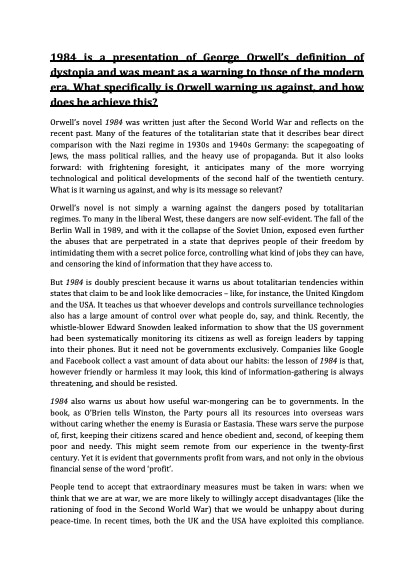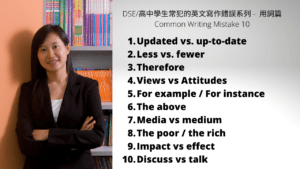
George Orwells 1984 Essay Examples – definition of dystopia and his warning
George Orwells 1984 Essay Answers by Experts
Question 1:
1984 is a presentation of George Orwell’s definition of dystopia and was meant as a warning to those of the modern era. What specifically is Orwell warning us against, and how does he achieve this?
Orwell’s novel 1984 was written just after the Second World War and reflects on the recent past. Many of the features of the totalitarian state that it describes bear direct comparison with the Nazi regime in 1930s and 1940s Germany: the scapegoating of Jews, the mass political rallies, and the heavy use of propaganda. But it also looks forward: with frightening foresight, it anticipates many of the more worrying technological and political developments of the second half of the twentieth century. What is it warning us against, and why is its message so relevant?
Orwell’s novel is not simply a warning against the dangers posed by totalitarian regimes. To many in the liberal West, these dangers are now self-evident. The fall of the Berlin Wall in 1989, and with it the collapse of the Soviet Union, exposed even further the abuses that are perpetrated in a state that deprives people of their freedom by intimidating them with a secret police force, controlling what kind of jobs they can have, and censoring the kind of information that they have access to.
But 1984 is doubly prescient because it warns us about totalitarian tendencies within states that claim to be and look like democracies – like, for instance, the United Kingdom and the USA. It teaches us that whoever develops and controls surveillance technologies also has a large amount of control over what people do, say, and think. Recently, the whistle-blower Edward Snowden leaked information to show that the US government had been systematically monitoring its citizens as well as foreign leaders by tapping into their phones. But it need not be governments exclusively. Companies like Google and Facebook collect a vast amount of data about our habits: the lesson of 1984 is that, however friendly or harmless it may look, this kind of information-gathering is always threatening, and should be resisted.
1984 also warns us about how useful war-mongering can be to governments. In the book, as O’Brien tells Winston, the Party pours all its resources into overseas wars without caring whether the enemy is Eurasia or Eastasia. These wars serve the purpose of, first, keeping their citizens scared and hence obedient and, second, of keeping them poor and needy. This might seem remote from our experience in the twenty-first century. Yet it is evident that governments profit from wars, and not only in the obvious financial sense of the word ‘profit’.
People tend to accept that extraordinary measures must be taken in wars: when we think that we are at war, we are more likely to willingly accept disadvantages (like the rationing of food in the Second World War) that we would be unhappy about during peace-time. In recent times, both the UK and the USA have exploited this compliance. Declaring a ‘War on Terror’ and even a ‘War on Drugs’ has given them a justification for monitoring or arresting their own citizens under the pretext that, for instance, they might be terrorists or drug-dealers. As in 1984, foreign wars paradoxically entitle governments to crack down at home and thereby consolidate their own power. 1984 therefore offers a persuasive warning about the threats modernity poses to our individual freedoms.


